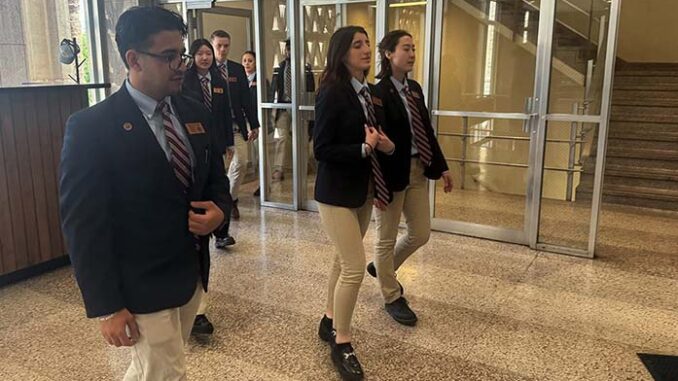
They can be seen sitting quietly on the sidelines of legislative committee hearings in their blazers, striped ties and khakis, or bustling around the House or Senate floor delivering papers to lawmakers.
These college students are the Legislature’s pages, quiet but essential workers that one lawmaker compared to “the oil in a machine that keeps things running.”
Pages are college students hired by the Legislature to assist lawmakers and staff in running day-to-day operations. Besides working in committees and on the floor, that can include anything from answering constituent phone calls to setting up hearing rooms and giving information to visitors.
“We’re part of the village that makes it as easy and as seamless as possible for them (senators) to do their work for their constituents,” said Rose Parker, a senior Senate page.
Both the House and Senate hire a group of pages each session and some – like Parker – will return year after year. Parker, now in her third year at the Legislature, said being a page offers a different look into lawmaking than other internships at the body.
“Our office is unique in that we are able to communicate and cross paths with everybody on campus and in this building, whereas in some of the other internships it’s very specific,” Parker said.
RELATED STORY: Succeeding by failing: ‘Virtue signaling’ runs high in the Legislature
Her fellow Senate pages agreed, saying the page program allows them to explore a wide variety of duties.
“My favorite thing about being a page is there’s no dull day and no day is the same,” said Marty Ley, a page and a student at Arizona State University. “We show up not really knowing what the day ahead of us entails.”
That work doesn’t go unnoticed: Pages said lawmakers frequently thank them for their assistance and often stop just to chat or say hi.
“I do really feel like the pages are valued by the senators and the other staff around here, which makes the job very fulfilling,” Ley said.
Sen. David Farnsworth, R-Mesa, has seen many pages come and go during his tenure in the Senate and said one word can be used to describe them – selfless.
“Every year, from my perspective, it seems like they’re getting better and better and they’ve always been great, but consistently they’re so cheerful and so willing to please,” Farnsworth said. “They make the stressful environment down here so much more pleasant.”
Farnsworth made the “oil in a machine” comparison, a sentiment that the pages echoed.
“You are a part of that legislative process even though you don’t have a vote or you don’t have a big role,” said Carlos Nowakowski, a Senate page and ASU student. “We do the little things so they can do the big things.”
Nowakowski and his fellow pages say they’ve learned a lot from observing and working with lawmakers and legislative staff. Madison Nastri, another Senate page, said that even though she does not plan on going into politics, she’s learned a lot from the position that she can carry with her in her career journey.
“Listening to them talk, I swear I learned more about economic policy than in a lot of my econ classes,” Nastri said of her time sitting in on the Senate Finance and Commerce Committee.
The pages agreed that getting involved in local government was not difficult, and they wish that more people would follow their lead. Nowakowski said he wants to see more regular citizens coming to committee meetings to testify before lawmakers and let their voices be heard.
“I honestly find it unfortunate that most of those people who go up to that mic and give a testimony are getting paid or are working for someone, and it’s not really like coming from the local residents who actually live here,” Nowakowski said.
“I feel like those are impactful statements and should honestly mean the most, and it’s just unfortunate that there are so little local residents who actually come to the Senate to testify on a bill,” he said of citizen testimony.
Ley agreed, saying being a page has given him a look into local government that most young people don’t care to seek out.
“It doesn’t take a whole lot of effort to understand what’s going on around us and to understand how impactful what’s being talked about in this building is for our lives, for our families’ lives, for other Arizonans,” Ley said.
